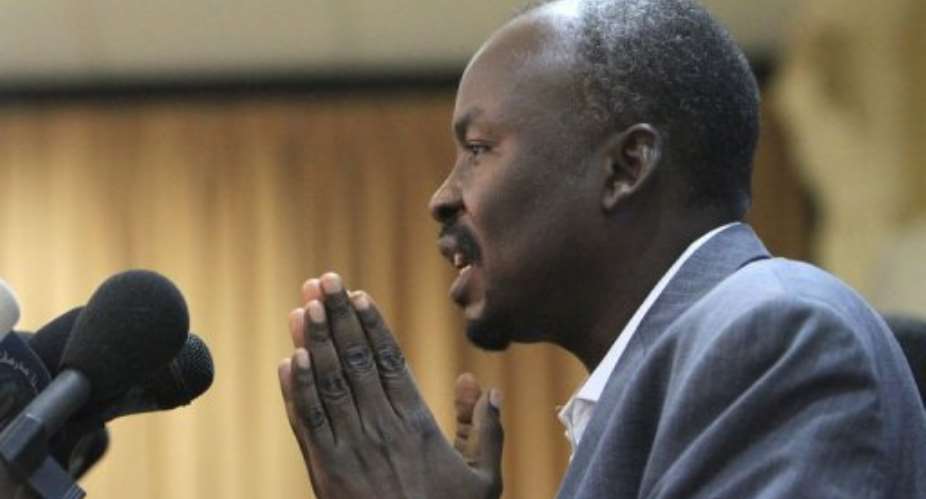KHARTOUM, Sudan (AFP) - The governor of Sudan's embattled state of South Kordofan said on Tuesday he was committed to peace, and that the aim of the ongoing military campaign was to get rebels to the negotiating table.
"We are doing our best to keep the length of this conflict as short as possible, because we believe that military operations are not a goal, but are a tool to push the other side to the negotiating table," Ahmed Harun told a news conference in Khartoum.
"We are committed to peace and to dialogue," said Harun, who is wanted by the International Criminal Court on charges of war crimes in Sudan's western Darfur region.
He rejected allegations that the army was targeting specific ethnic groups and that humanitarian access had been denied to those affected by the conflict.
Fighting has raged in the ethnically divided border state of South Kordofan since early June, between the Sudanese army and Nuba militiamen who fought with the SPLA, the former rebel army of the south, during their decades-long civil war with Khartoum.
An internal UN report seen by AFP said the army's systematic attacks, targeting the state's indigenous Nuba peoples, could amount to war crimes and crimes against humanity.
The conflict erupted shortly after, and partly because of, Harun's re-election as governor in a bitterly disputed May poll that pitted him against Abdelaziz al-Hilu, his former deputy and a senior SPLA commander, who pulled out of the race alleging fraud.
The Sudanese army's insistence on expelling or forcefully disarming SPLA elements in the border state, one of the key former civil war battlegrounds, is what appears to have actually triggered the fighting.
Khartoum says the SPLA sparked it off and that it is battling an internal rebellion.
"It is the plan of Abdelaziz to colonise Kadugli, in coordination with the Darfur rebel groups, and then to march on Khartoum," Harun charged on Tuesday.
He said that troops from the Justice and Equality Movement (JEM), Darfur's most heavily armed rebels, had entered South Kordofan from the south and fought alongside Hilu's men last week in Al-Tais, 25 kilometres (16 miles) south of the state capital.
"But we destroyed them completely, and captured their leader," he added.
The army initially denied that Darfuri rebels were involved.
Malik Agar, who heads the political wing of the ex-rebel forces (SPLM north), had earlier warned of a "coordinated" uprising between Blue Nile state in the east and Darfur in the west, unless Khartoum agreed to a ceasefire in South Kordofan.
Harun downplayed concerns about the conflict spreading, however, claiming that only three out of 19 localities in South Kordofan, namely Kadugli, Buram and Kauda, had been affected.
The UN peacekeeping mission in Sudan (UNMIS), whose mandate expired with the secession of the south on July 9, has reported army air strikes in a number of other locations, including Talodi and Deleng, and estimated that more than 70,000 people have been displaced throughout the state.
UNMIS, together with the UN humanitarian office (OCHA) and the World Food Programme (WFP), have repeatedly complained about restricted humanitarian access to those in need.
But Harun insisted on Tuesday that there was no ethnic dimension to the war, and said he was fully cooperating with the different humanitarian agencies operating in South Kordofan.
"Our partners in this are WFP, UNICEF (the UN children's fund) and WHO (World Health Organisation). I have never heard a complaint from those agencies about restrictions on their freedom of movement," he said.
Two weeks ago, a US monitoring group separately claimed it has fresh satellite images that support eyewitness accounts of mass graves being dug near a secondary school in Kadugli, to bury 100 or more people killed by the Sudanese army last month.
Harun again denied the charges, saying he had instructed the Sudanese Red Crescent to burn any bodies they found of people killed in the fighting.
© 2011 AFP





 Saglemi Housing Project will not be left to rot – Kojo Oppong Nkrumah
Saglemi Housing Project will not be left to rot – Kojo Oppong Nkrumah
 Transport fares hike: GPRTU issue two-day ultimatum
Transport fares hike: GPRTU issue two-day ultimatum
 ARC endorses Alan as presidential candidate – Buaben Asamoa
ARC endorses Alan as presidential candidate – Buaben Asamoa
 Akufo-Addo appoints Kwasi Agyei as new Controller and Accountant-General
Akufo-Addo appoints Kwasi Agyei as new Controller and Accountant-General
 PNC dismiss reports of mass resignations
PNC dismiss reports of mass resignations
 PAC advocates for revenue collectors to be engaged on commission basis, not full...
PAC advocates for revenue collectors to be engaged on commission basis, not full...
 Genser Energy commissions 110km of natural gas pipeline at Anwomaso
Genser Energy commissions 110km of natural gas pipeline at Anwomaso
 Naa Torshie calls for tolerance, peace ahead of 2024 election
Naa Torshie calls for tolerance, peace ahead of 2024 election
 Asantehene commends Matthew Opoku Prempeh for conceiving GENSER Kumasi Pipeline ...
Asantehene commends Matthew Opoku Prempeh for conceiving GENSER Kumasi Pipeline ...
 Let’s do away with ‘slash and burn politics’ in Ghana — Dr Adutwum
Let’s do away with ‘slash and burn politics’ in Ghana — Dr Adutwum
